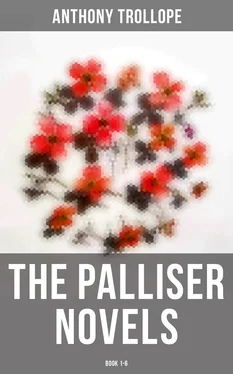"But you don't mean to say, Lady Glencora, that you would really advocate equality?" said Mrs. Bonteen.
"I do mean to say so, Mrs. Bonteen. And I mean to go further, and to tell you that you are no Liberal at heart unless you do so likewise; unless that is the basis of your political aspirations."
"Pray let me speak for myself, Lady Glencora."
"By no means,—not when you are criticising me and my politics. Do you not wish to make the lower orders comfortable?"
"Certainly," said Mrs. Bonteen.
"And educated, and happy and good?"
"Undoubtedly."
"To make them as comfortable and as good as yourself?"
"Better if possible."
"And I'm sure you wish to make yourself as good and as comfortable as anybody else,—as those above you, if anybody is above you? You will admit that?"
"Yes;—if I understand you."
"Then you have admitted everything, and are an advocate for general equality,—just as Mr. Monk is, and as I am. There is no getting out of it;—is there, Mr. Kennedy?" Then dinner was announced, and Mr. Kennedy walked off with the French Republican on his arm. As she went, she whispered into Mr. Kennedy's ear, "You will understand me. I am not saying that people are equal; but that the tendency of all law-making and of all governing should be to reduce the inequalities." In answer to which Mr. Kennedy said not a word. Lady Glencora's politics were too fast and furious for his nature.
A week passed by at Loughlinter, at the end of which Phineas found himself on terms of friendly intercourse with all the political magnates assembled in the house, but especially with Mr. Monk. He had determined that he would not follow Lady Laura's advice as to his selection of companions, if in doing so he should be driven even to a seeming of intrusion. He made no attempt to sit at the feet of anybody, and would stand aloof when bigger men than himself were talking, and was content to be less,—as indeed he was less,—than Mr. Bonteen or Mr. Ratler. But at the end of a week he found that, without any effort on his part,—almost in opposition to efforts on his part,—he had fallen into an easy pleasant way with these men which was very delightful to him. He had killed a stag in company with Mr. Palliser, and had stopped beneath a crag to discuss with him a question as to the duty on Irish malt. He had played chess with Mr. Gresham, and had been told that gentleman's opinion on the trial of Mr. Jefferson Davis. Lord Brentford had—at last—called him Finn, and had proved to him that nothing was known in Ireland about sheep. But with Mr. Monk he had had long discussions on abstract questions in politics,—and before the week was over was almost disposed to call himself a disciple, or, at least, a follower of Mr. Monk. Why not of Mr. Monk as well as of any one else? Mr. Monk was in the Cabinet, and of all the members of the Cabinet was the most advanced Liberal. "Lady Glencora was not so far wrong the other night," Mr. Monk said to him. "Equality is an ugly word and shouldn't be used. It misleads, and frightens, and is a bugbear. And she, in using it, had not perhaps a clearly defined meaning for it in her own mind. But the wish of every honest man should be to assist in lifting up those below him, till they be something nearer his own level than he finds them." To this Phineas assented,—and by degrees he found himself assenting to a great many things that Mr. Monk said to him.
Mr. Monk was a thin, tall, gaunt man, who had devoted his whole life to politics, hitherto without any personal reward beyond that which came to him from the reputation of his name, and from the honour of a seat in Parliament. He was one of four or five brothers,—and all besides him were in trade. They had prospered in trade, whereas he had prospered solely in politics; and men said that he was dependent altogether on what his relatives supplied for his support. He had now been in Parliament for more than twenty years, and had been known not only as a Radical but as a Democrat. Ten years since, when he had risen to fame, but not to repute, among the men who then governed England, nobody dreamed that Joshua Monk would ever be a paid servant of the Crown. He had inveighed against one minister after another as though they all deserved impeachment. He had advocated political doctrines which at that time seemed to be altogether at variance with any possibility of governing according to English rules of government. He had been regarded as a pestilent thorn in the sides of all ministers. But now he was a member of the Cabinet, and those whom he had terrified in the old days began to find that he was not so much unlike other men. There are but few horses which you cannot put into harness, and those of the highest spirit will generally do your work the best.
Phineas, who had his eyes about him, thought that he could perceive that Mr. Palliser did not shoot a deer with Mr. Ratler, and that Mr. Gresham played no chess with Mr. Bonteen. Bonteen, indeed, was a noisy pushing man whom nobody seemed to like, and Phineas wondered why he should be at Loughlinter, and why he should be in office. His friend Laurence Fitzgibbon had indeed once endeavoured to explain this. "A man who can vote hard, as I call it; and who will speak a few words now and then as they're wanted, without any ambition that way, may always have his price. And if he has a pretty wife into the bargain, he ought to have a pleasant time of it." Mr. Ratler no doubt was a very useful man, who thoroughly knew his business; but yet, as it seemed to Phineas, no very great distinction was shown to Mr. Ratler at Loughlinter. "If I got as high as that," he said to himself, "I should think myself a miracle of luck. And yet nobody seems to think anything of Ratler. It is all nothing unless one can go to the very top."
"I believe I did right to accept office," Mr. Monk said to him one day, as they sat together on a rock close by one of the little bridges over the Linter. "Indeed, unless a man does so when the bonds of the office tendered to him are made compatible with his own views, he declines to proceed on the open path towards the prosecution of those views. A man who is combating one ministry after another, and striving to imbue those ministers with his convictions, can hardly decline to become a minister himself when he finds that those convictions of his own are henceforth,—or at least for some time to come,—to be the ministerial convictions of the day. Do you follow me?"
"Very clearly," said Phineas. "You would have denied your own children had you refused."
"Unless indeed a man were to feel that he was in some way unfitted for office work. I very nearly provided for myself an escape on that plea;—but when I came to sift it, I thought that it would be false. But let me tell you that the delight of political life is altogether in opposition. Why, it is freedom against slavery, fire against clay, movement against stagnation! The very inaccuracy which is permitted to opposition is in itself a charm worth more than all the patronage and all the prestige of ministerial power. You'll try them both, and then say if you do not agree with me. Give me the full swing of the benches below the gangway, where I needed to care for no one, and could always enjoy myself on my legs as long as I felt that I was true to those who sent me there! That is all over now. They have got me into harness, and my shoulders are sore. The oats, however, are of the best, and the hay is unexceptionable."
CHAPTER XV
DONALD BEAN'S PONY
Table of Contents
Phineas liked being told that the pleasures of opposition and the pleasures of office were both open to him,—and he liked also to be the chosen receptacle of Mr. Monk's confidence. He had come to understand that he was expected to remain ten days at Loughlinter, and that then there was to be a general movement. Since the first day he had seen but little of Mr. Kennedy, but he had found himself very frequently with Lady Laura. And then had come up the question of his projected trip to Paris with Lord Chiltern. He had received a letter from Lord Chiltern.
Читать дальше












